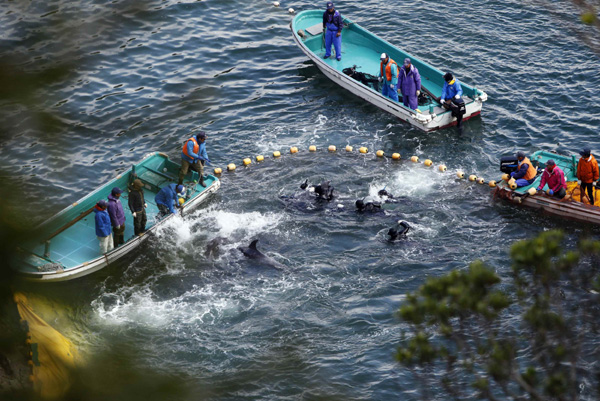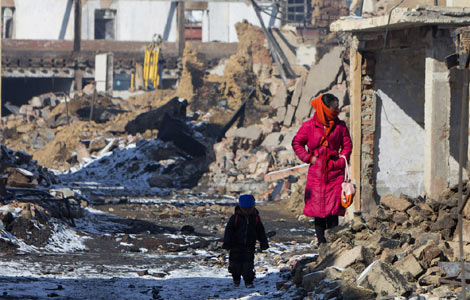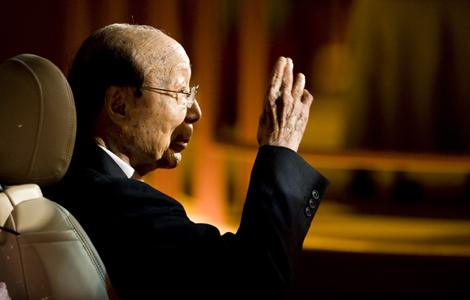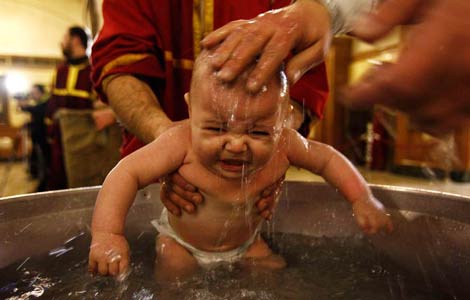Japan seeks US understanding about dolphin hunt
Updated: 2014-01-21 22:24
(Xinhua/Agencies)
|
|||||||||||
 |
|
Fishermen in wetsuits hunt dolphins at a cove in Taiji, western Japan, January 20, 2014. [Photo/Agencies] |
Kennedy made her remarks online in both English and Japanese and her comments were met with both praise from conservationists and condemnation from Japanese.
The annual cull involves more than 200 migrating Bottlenose dolphins being corralled into a cove in Taiji and surrounded by local fishermen in boats banging polls in the sea to scare the animals and throw off their sonar abilities.
The fishermen then attack the dolphins with knives, before taking them ashore to slaughter them in warehouses.
Conservationists, including the Sea Shepherd Conservation Society (SSCS), who monitors the annual cull, say that the hunt is unnecessarily brutal and rare albino dolphins as well as baby dolphins are among the hundreds of Bottlenoses slaughtered.
But Nisaka maintained that the practice forms an integral part of the village's deep-rooted cultural heritage and urged the international community to take a "broader view" of the town's annual ritual.
Meanwhile, opponents to Kennedy's comments said that those slamming the practice as being inhumane were being hypocritical, as other animals are slaughtered daily for consumption and on a far larger, global scale.
The controversial annual dolphin hunt in Taiji was the focus of the movie "The Cove," a 2009 documentary film that analyzes and questions dolphin hunting practices in Japan.
The documentary was awarded the Academy Award for Best Documentary Feature in 2010, but questions have been raised about the movie's neutrality and negative portrayal of Japanese people.
The film was directed by former National Geographic photographer Louie Psihoyos and some sections of the film were filmed secretly in 2007 using underwater microphones, night vision cameras, and high-definition cameras disguised as rocks.
Japan maintains that killing dolphins is not banned under any international treaty and that the animals are not endangered.
Yoshinobu Nisaka, the governor of Wakayama prefecture where Taiji is located, rejected Kennedy's concerns.
"Dietary culture varies and it is the wisdom of civilization to mutually respect other standpoints unless the world faces a lack of resources," Nisaka was quoted by Kyodo news agency as telling reporters.
The Taiji fishing union rejected Reuters requests for comment.
The dolphin hunting season runs yearly from September to March. Sea Shepherd said 176 marine mammals had been killed this season before Tuesday's slaughter.
Monitoring is difficult, with fishermen erecting tarpaulins over their killing area and blocking access to the cove.
Related Stories
US ambassador concerned about Japan's dolphin hunt 2014-01-20 10:58
'Heroes' actress visits Japan dolphin hunt town 2010-03-26 14:00
Oscar-nominated dolphin hunt film to get Japan screening 2010-03-04 16:30
Japanese Town Starts Dolphin Hunt Under Global Spotlight 2009-09-15 09:23
Dolphin hunt sags amid mercury fears 2008-01-31 09:45
Today's Top News
West, Iran activate landmark nuclear deal
Baghdad bomb blasts kill 26
Iran not to accept Geneva communique
China to deepen ties with Belarus
Danish minister tours Beijing on her bicycle
EU suspends sanctions against Iran
US warns sanctions against Ukraine
Human spread of H7N9 'sporadic'
Hot Topics
Lunar probe , China growth forecasts, Emission rules get tougher, China seen through 'colored lens', International board,
Editor's Picks

|

|

|

|

|

|





